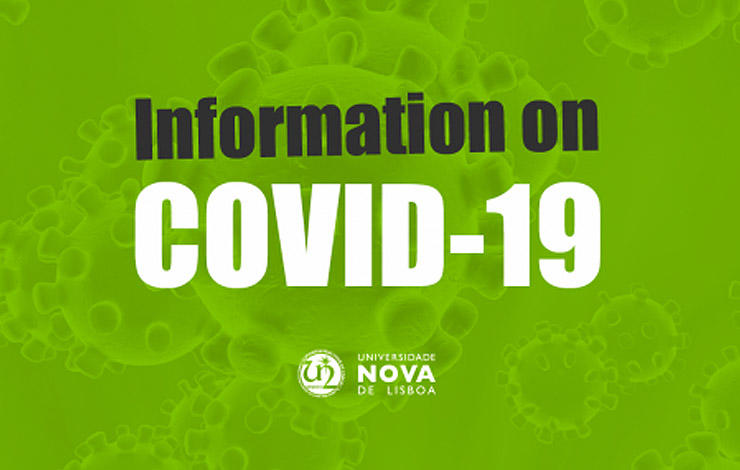05-03-2020

NOVA University Lisbon suspends face-to-face classes
On the day that the World Health Organization declared COVID-19 a pandemic, NOVA University Lisbon decided, starting next Monday, March 16, 2020, to suspend all face-to-face classes that have not yet been replaced by teaching through digital platforms.
More detailed information about the ongoing adaptation process will be provided by the Schools / Institutes.
In the absence of any new development, the situation will be reassessed by the University on April 13, 2020. NOVA is constantly monitoring, and with the utmost attention, the evolution of the pandemic. The decision aims to reduce the risk of contagion and safeguard the safety of the NOVA community and is taken in line with the recommendations of the health authorities, who are responsible for deciding which measures to implement at any given moment.
Attentive and vigilant as the situation in the country evolves, NOVA will regularly update the information, adapting the necessary response measures to combat the pandemic.
The main concern of NOVA is the safety of its academic community.
What is a coronavirus?
Coronaviruses are a type of virus known for causing disease in humans and are common across the world. COVID-19 is a disease causes by a new strain of coronavirus first identified in Wuhan City (China) in December 2019.
The incubation period of COVID-19 is between 2 and 14 days. This means that if a person remains well 14 days after contact with someone with a confirmed case of COVID-19, it is unlikely that they have been infected.
The following symptoms may develop in the 14 days after exposure to someone who has COVID-19 infection:
Generally, these infections can cause more severe symptoms in people with weakened immune system, older people, and those with long-term conditions like diabetes, cancer and chronic lung disease.
How is COVID-19 spread?
From what we know about other coronaviruses, spread of COVID-19 is most likely to happen when there is close contact (within 2 metres) with an infected person. It is likely that the risk increases the longer someone has close contact with an infected person.
Droplets produced when an infected person coughs or sneezes (termed respiratory secretions) containing the virus are most likely to be the most important means of transmission.
There are two routes by which people could become infected:
How can I prevent the spread of infection?
here is currently no vaccine to prevent COVID-19. The best way to prevent infection is to avoid being exposed to the virus.
There are general principles anyone can follow to help prevent the spread of respiratory viruses, including:
Face masks for the general public, students or staff are not recommended to protect from infection, as there is no evidence of benefit from their use outside healthcare environments.
I recently traveled abroad. What should I do?
NOVA takes into consideration the guidelines of the Portuguese Directorate-General for Health (Direção-Geral de Saúde - SNS) and the World Health Organization on COVID-19. According to the University's Contingency Plan, all students and staff returning from an area with active community transmission of the new coronavirus, including:
must respect, as a precautionary principle of Public Health, a home prophylactic isolation period of 14 days after their return, during which they will monitor the emergence of any symptoms.
All people in these circumstances, during that period, have to:
What to do if students or staff become unwell and believe they have been exposed to COVID-19 (either through travel to a specified country/area or contact with a confirmed case)?
(Information in Portuguese)
Consulte informação sobre o Plano de Contingência da Universidade NOVA de Lisboa.